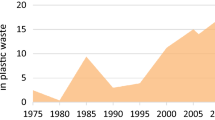Abstract
Increasing municipal solid waste (MSW) has caused severe environmental pollution and social problems, which require effective treatment and resource utilization. Therefore, combined with a sustainable approach, an urban vacuum waste collection (VWC) system was established in this study. To optimize VWC management, a bi-objective model is created to address the issue of waste management in this work in an environmentally friendly way. This model evaluates the economic benefits, social benefits, and environmental costs of reducing greenhouse gas emissions (GHGs). The proposed model is solved using the augmented ε-constraint method. Numeric results show the efficiency of the mentioned method. A sensitivity analysis is conducted to verify the model. The results depict that the VWC model is sensitive to parameters such as budget, transfer station capacity, treatment facilities’ capacity, and infrastructure costs.









Similar content being viewed by others
References
H. Farrokhi-Asl, A. Makui, A. Jabbarzadeh, F. Barzinpour, Solving a multi-objective sustainable waste collection problem considering a new collection network. Oper Res 20, 1977–2015 (2018). https://doi.org/10.1007/s12351-018-0415-0
A. Sbihi, R.W.J.O. Eglese, Combinatorial optimization and green logistics. 4OR 5(2), 99–116 (2007)
G. Brundtland, M. Khalid, S. Agnelli, S. Al-Athel, B. Chidzero, L. Fadika, S. Okita, Our Common Future (‘Brundtland report’) (Oxford University Press, USA, 1987)
B.D. Azevedo, L.F. Scavarda, R.G.G. Caiado, Urban solid waste management in developing countries from the sustainable supply chain management perspective: a case study of Brazil’s largest slum. J Clean Prod 233, 1377–1386 (2019)
D. Hoornweg, P. Bhada-Tata, What a waste: a global review of solid waste management. 1, 1–10 (2012)
A. Aremu, In-town tour optimization of conventional mode for municipal solid waste collection. Niger J Technol 32(3), 443–449 (2013)
S. Das, B.K. Bhattacharyya, Optimization of municipal solid waste collection and transportation routes. Waste Manag 43, 9–18 (2015)
D. Hidalgo, J.M. Martín-Marroquín, F. Corona, J.L. Juaristi, Sustainable vacuum waste collection systems in areas of difficult access. Tunn Undergr Space Technol 81, 221–227 (2018). https://doi.org/10.1016/j.tust.2018.07.026
M. Dehghan-Bonari, A. Bakhshi, A. Aghsami, F. Jolai, Green supply chain management through call option contract and revenue-sharing contract to cope with demand uncertainty. Cleaner Logistics and Supply Chain 2, 100010 (2021)
C. Fernández, F. Manyà, C. Mateu, F. Sole-Mauri, Approximate dynamic programming for automated vacuum waste collection systems. Environ Model Softw 67, 128–137 (2015). https://doi.org/10.1016/j.envsoft.2015.01.013
C. Fernández, F. Manyà, C. Mateu, F. Sole-Mauri, Modeling energy consumption in automated vacuum waste collection systems. Environ Model Softw 56, 63–73 (2014). https://doi.org/10.1016/j.envsoft.2013.11.013
R. Béjar, C. Fernández, C. Mateu, F. Manyà, F. Sole-Mauri, D. Vidal, The Automated Vacuum Waste Collection Optimization Problem (Paper presented at the Proceedings of the National Conference on Artificial Intelligence, 1: . 264–266 (2012)
J. Xu, R. Li, Y. Shi, Y. Deng, Life cycle assessment-based optimization approaches for sustainable disposal of municipal solid waste. Sustain Cities Soc 103665 (2022)
A. Iriarte, X. Gabarrell, J. Rieradevall, LCA of selective waste collection systems in dense urban areas. Waste Manag 29(2), 903–914 (2009). https://doi.org/10.1016/j.wasman.2008.06.002
H. Punkkinen, E. Merta, N. Teerioja, K. Moliis, E. Kuvaja, Environmental sustainability comparison of a hypothetical pneumatic waste collection system and a door-to-door system. Waste Manag 32(10), 1775–1781 (2012). https://doi.org/10.1016/j.wasman.2012.05.003
A.A. Usón, G. Ferreira, D.Z. Vásquez, I.Z. Bribián, E.L.J.S.O.T.T.E. Sastresa, Environmental-benefit analysis of two urban waste collection systems. Sci Total Environ 463, 72–77 (2013)
P.A. Wäger, R. Hischier, M. Eugster, Environmental impacts of the Swiss collection and recovery systems for Waste Electrical and Electronic Equipment (WEEE): a follow-up. Sci Total Environ 409(10), 1746–1756 (2011). https://doi.org/10.1016/j.scitotenv.2011.01.050
K. Honkio, The future of waste collection? Underground automated waste conveying systems. Waste Manag World 10(4), (2009)
N. Teerioja, K. Moliis, E. Kuvaja, M. Ollikainen, H. Punkkinen, E. Merta, Pneumatic vs. door-to-door waste collection systems in existing urban areas: a comparison of economic performance. Waste Manag 32(10), 1782–1791 (2012). https://doi.org/10.1016/j.wasman.2012.05.027
D. Nakou, A. Benardos, D. Kaliampakos, Assessing the financial and environmental performance of underground automated vacuum waste collection systems. Tunn Undergr Space Technol 41, 263–271 (2014). https://doi.org/10.1016/j.tust.2013.12.005
M. Dehghan-Bonari, J. Heydari, How a novel option contract helps a green product to enter a traditional product’s retailing channel: a mathematical modeling approach. J Retail Consum Serv 69, 103090 (2022). https://doi.org/10.1016/j.jretconser.2022.103090
G. Mavrotas, Effective implementation of the ε-constraint method in Multi-Objective Mathematical Programming problems. Appl Math Comput 213(2), 455–465 (2009). https://doi.org/10.1016/j.amc.2009.03.037
Funding
The study was supported by “The Research Fund for the Dectoral Program of Jinling Institute of Technology, China (Grant No. 40610164).”
Author information
Authors and Affiliations
Corresponding author
Ethics declarations
Conflict of interest
The author declares no competing interests.
Rights and permissions
Springer Nature or its licensor (e.g. a society or other partner) holds exclusive rights to this article under a publishing agreement with the author(s) or other rightsholder(s); author self-archiving of the accepted manuscript version of this article is solely governed by the terms of such publishing agreement and applicable law.
About this article
Cite this article
Zheng, Q. Proposal and assessment of a sustainable method for urban waste transportation and selling: real-life case study. emergent mater. 6, 1383–1391 (2023). https://doi.org/10.1007/s42247-023-00516-w
Received:
Accepted:
Published:
Issue Date:
DOI: https://doi.org/10.1007/s42247-023-00516-w




